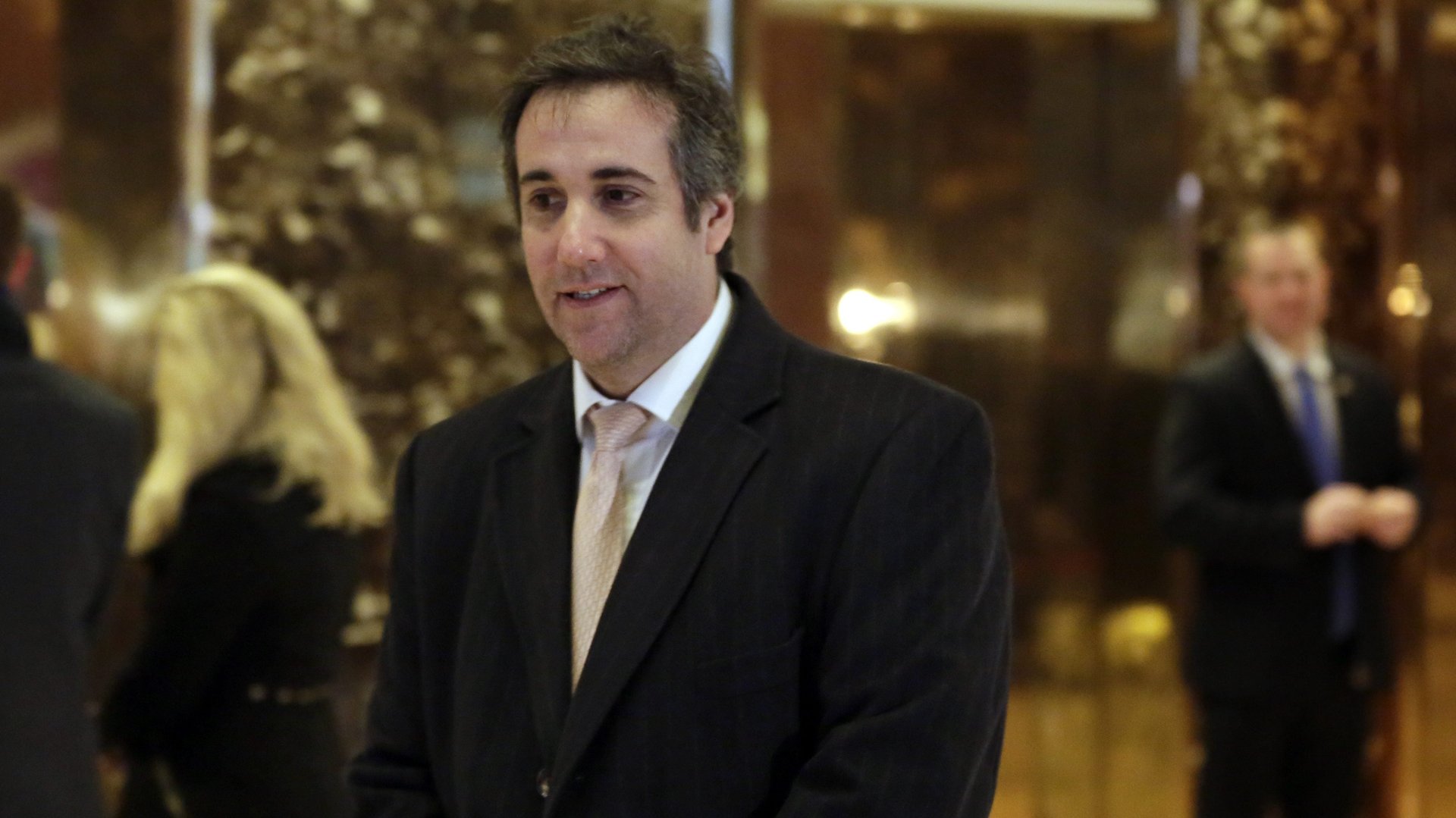Michael Cohen and the damage done
Update, Dec. 12: Cohen was sentenced to three years in prison.


Update, Dec. 12: Cohen was sentenced to three years in prison.
Michael Cohen undermined American democracy and cheated US voters in calculated acts that he committed for his own personal gain, federal prosecutors say.
In a sentencing document filed today (Dec. 7), New York-based prosecutors recommend Cohen, Donald Trump’s onetime personal lawyer, spend several years in prison and pay a considerable fine. Cohen, writes deputy US attorney Robert Khuzami of the Southern District of New York, was the mastermind of his own demise, by aiding and abetting “Individual 1,” a reference to the president.
Cohen has already been charged with four different crimes: “willful tax evasion, making false statements to a financial institution, illegal campaign contributions, and making false statements to Congress.” The sentencing recommendation lays out the reasons he should serve a term of 42 months in prison:
1. He didn’t really cooperate
Cohen “repeatedly declined to provide full information about the scope of any additional criminal conduct in which he may have engaged or had knowledge,” Khuzami writes. Later, the prosecutor appears to dismiss Cohen’s attempts to rehabilitate his reputation by claiming he was testifying against Trump for the good of his country, as Cohen said in July:
While Cohen’s provision of information to the SCO [special counsel Robert Mueller’s office] merits credit, his description of his actions as arising solely from some “personal resolve”–as opposed to arising from the pendency of criminal charges and the desire for leniency–ignores that Cohen first reached out to meet with the SCO at a time when he knew he was under imminent threat of indictment in this District. As such, any suggestion by Cohen that his meetings with law enforcement reflect a selfless and unprompted about-face are overstated.
Had Cohen “actually cooperated, it could have been fruitful,” he notes. But his promise to cooperate at some unspecified time in the future is of “limited use.” A footnote adds:
Cohen provided information to the NY AG [state attorney general] not as a cooperating witness who was exposing himself to potential criminal or civil liability but instead as a witness who could have been compelled to provide that testimony. Fulfilling that basic legal responsibility voluntarily does not warrant a reduced sentence – particularly when one waits until he is charged with federal crimes before doing so.
2. He cheated US voters
Cohen’s payments to two women who allege they had affairs with Trump—later revealed to be porn actress Stormy Daniels and former Playboy model Karen McDougal—on the “eve” of the US 2016 election, undermined American democracy, the document says, in a strong defense of US campaign finance laws.
While many Americans who desired a particular outcome to the election knocked on doors, toiled at phone banks, or found any number of other legal ways to make their voices heard, Cohen sought to influence the election from the shadows. He did so by orchestrating secret and illegal payments to silence two women who otherwise would have made public their alleged extramarital affairs with Individual-1. In the process, Cohen deceived the voting public by hiding alleged facts that he believed would have had a substantial effect on the election.
Cohen did so at the behest of Trump, he claims.
3. He bragged about creating president Trump
Cohen’s actions were no “brief error in judgment,” as his defense suggests, Khuzami writes:
Not so. Cohen knew exactly where the line was, and he chose deliberately and repeatedly to cross it. Indeed, he was a licensed attorney with significant political experience and a history of campaign donations, and who was well-aware of the election laws. In fact, Cohen publicly and privately took credit for Individual-1’s political success, claiming–in a conversation that he secretly recorded–that he “started the whole thing . . . started the whole campaign” in 2012 when Individual-1 expressed an interest in running for President.
4. His lies to the IRS and Congress show disrespect for the US
Cohen evaded taxes for years, Khuzami writes. Between 2012 and 2016 alone, Cohen evaded taxes by “failing to report more than $4 million in income” to the Internal Revenue Service (IRS), avoiding $1.4 million in payments. He also pleaded guilty to making false statements to elected officials in a congressional investigation.
Taken alone, these are each serious crimes worthy of meaningful punishment. Taken together, these offenses reveal a man who knowingly sought to undermine core institutions of our democracy. His motivation to do so was not borne from naiveté, carelessness, misplaced loyalty, or political ideology. Rather, these were knowing and calculated acts.
Khuzami concludes, “After cheating the IRS for years, lying to banks and to Congress, and seeking to criminally influence the Presidential election, Cohen’s decision to plead guilty–rather than seek a pardon for his manifold crimes–does not make him a hero.”
Instead, he should serve a “substantial term of imprisonment,” and pay $500,000, as well as a fine.